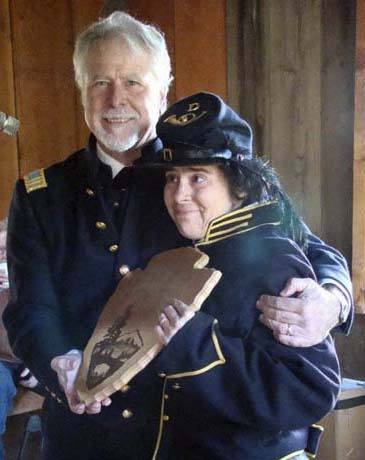There are many kinds of battles. In the field with guns raised and bullets flying; in a hospital room, as chemotherapy and pain killers fight off another enemy – cancer.
“Whatever battle you’re fighting, it’s a struggle and you do what you can and gather all your strength and other folks gather together to help you,” said Darlene Wahl, diagnosed in February 2009, with Ewing’s Sarcoma, a rare form of cancer in adults. “In a way, Mike is really “rallying the troops” to make the performance possible.”
Mike Vouri, chief of interpretation at the San Juan Island National Historical Park, as the playwright and star, joins Folksinger Michael Cohen and Director Chris DeStaffany in “The Life and Times of General George Pickett,”which is returning to Friday Harbor as a special benefit performance, Oct. 26, Wednesday, 7:30 p.m., at the San Juan Community Theatre. Proceeds will offset Wahl’s medical costs.
“She has put up a hell of a fight,” Vouri said. “This show is for her.”
Wahl served as an interpretive ranger at San Juan Island National Historical Park for more than 10 years. She is known for her solo folksinging and as a member of “Sugar on the Floor,” a folk group including her husband, Ken Arzarian, Lee McEnery and Cohen. She often performed with that group in the theater’s lobby, before and after the Pickett play.
This is the first performance since Vouri shelved the show in 2009 because of the strain on his voice, and the second held to raise funds for someone fighting cancer.
In 2005, Vouri held the show to raise funds for his partner, Susan Eyerly, who died of cancer just a year later.
Then just three years later, he found another person close to him also facing the disease.
“It was staggering,” said Vouri, recalling the look on Wahl’s pained face when she told him the news.
The idea of doing a benefit for her came to Vouri about a month ago, over a nostalgic conversation with Cohen.
That gave Vouri, Cohen and DeStaffany, little time to prepare, but they’re “Pickett” veterans with more than 14 shows under their belts.
The play covers Pickett’s life from his boyhood in Richmond, Va., to his death in the 1870s.
Along the way, Vouri offers a brisk interpretation of the 19th Century United States and its territories. Scenes are interspersed with Cohen’s banjo playing of period pieces, which reflect different moods in the show.
Several scenes include the “Pig War” when Pickett confronted Vancouver Island Governor Sir James Douglas and the Royal Navy over ownership of San Juan Island. The dispute over the island ended peacefully, without a singe shot fired in anger.
As a historian, Vouri says combining the arts and history brings out the humanity in otherwise dry accounts of the past. He compares it to the difference between dramatic paintings and static images from low-quality photographs in the Civil War era. Although the paintings may not be entirely accurate, they make you feel something.
“For many, history is as dry as a bone,” Wahl said. “He makes it so alive and so real.”
The story climaxes in what is known as the disastrous “Pickett’s Charge” that brought ruin to the Confederate Army at the Battle of Gettysburg during the Civil War.
Pickett was ordered to essentially send his men to death, and Wahl sees Vouri’s portrayal of the general as a man haunted by the slaughter.
“One thing that happens to Pickett in this play is that he becomes aware of the whole man, the empty chair when someone is killed in war,” Vouri said. “Everything that is attached to that life, children, wives, siblings, lovers are all impacted by death. Generals aren’t supposed to think of the men like that because they must commit them to battle, but in the case of George Pickett he became aware of the whole man.”
Vouri has first-hand experiences of the effects of war; not only was he a soldier in Vietnam, but later he worked for the Washington State Department of Veterans Affairs in the 1980s.
“I got an eyeful of war in Vietnam,” Vouri said. “War is war, when people get killed in any war it is terrible.”
That is, they say, why the National Park promotes the peaceful nature of the “Pig War.”
“It would be a better world if we exhausted every diplomatic argument possible, before men and women are sent into battle,” Vouri said. “War has a very long-term cost, the price is borne out over generations.”
Wahl also talks about Pickett’s suffering outside of war, how he lost his first wife in childbirth and how difficult life was in that period. Watching history makes her less afraid sometimes, less alone to think how people endure such rough times.
“It gives me strength and comfort. I am crossing my fingers that these treatments and everything don’t get in the way and that I will be feeling well enough to go to the show,” said Wahl. “I have to go to the show.”
Having cancer has shrunk her world — being sick often causes her to miss events or opportunities to connect with people.
“I need to have this. It keeps you in touch and access to the real world,” Wahl said. “You grab everything you can grab. Seeing the play is seeing what people have endured, have suffered, the human experience, we all need to think of that to keep plugging away and to go up against what is throw at us and keep that hope.”
Tickets,$20 in advance at the theatre box office.
For info, call the theatre at 378-3210, or the park at 378-2240, ext. 2228 or 2227 or visit www.sjctheatre.org.



